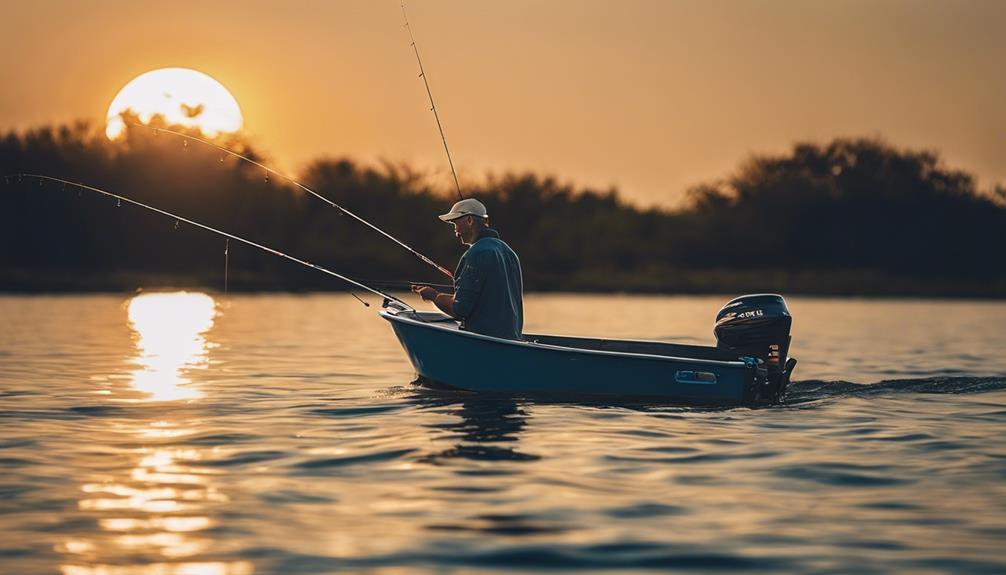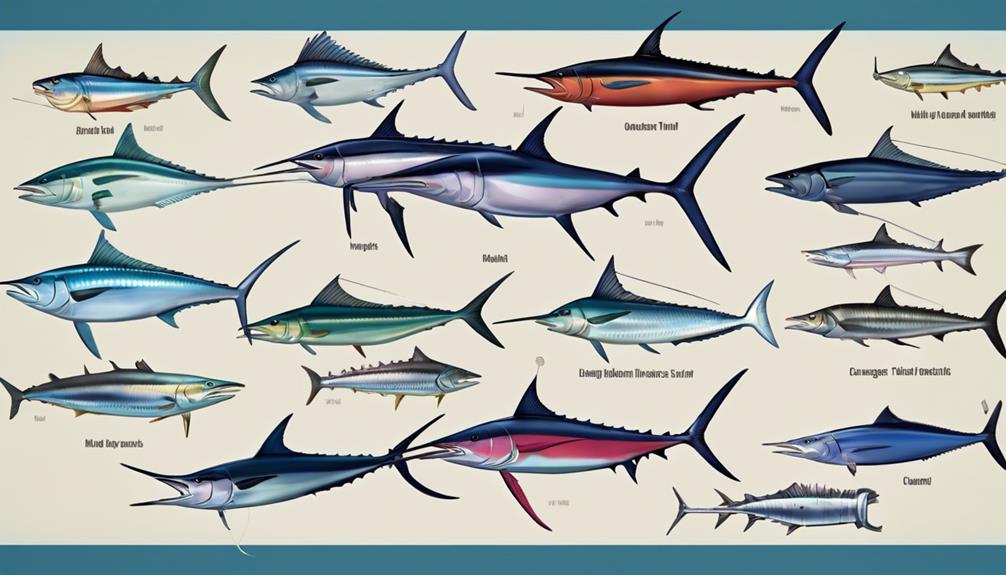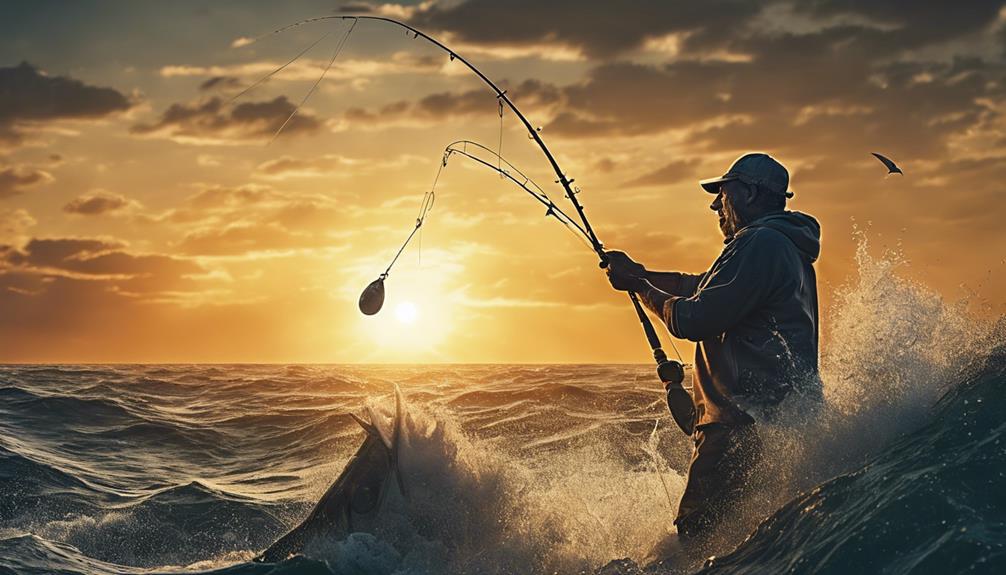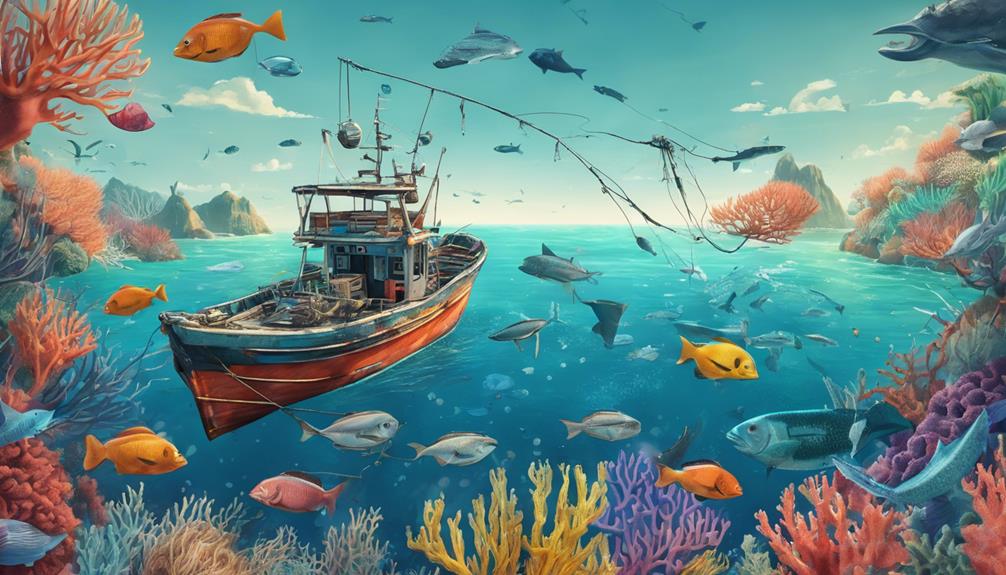For beginner deep-sea fishers, mastering the art of angling in the open ocean can be both thrilling and daunting. From selecting the right tackle to navigating the vast waters, there's a myriad of factors to consider when aiming for a successful catch.
But fear not, as this guide will equip you with essential tips to enhance your deep-sea fishing prowess and increase your chances of reeling in that prized trophy fish.
So, gear up, set sail, and let's navigate the waters of deep-sea fishing together.
Essential Gear for Deep Sea Fishing
When gearing up for deep sea fishing, ensure you pack essential items like a sturdy fishing rod and a reliable tackle box. These tools are crucial for a successful fishing trip. Proper gear maintenance is key. Before heading out, check that your fishing rod is in good condition, with no cracks or damage that could compromise its strength. Additionally, organize your tackle box efficiently, making it easy to access different hooks, sinkers, and lures when needed.
Wearing the proper attire is essential for deep sea fishing. Dress in layers to adjust to changing weather conditions, and don't forget a waterproof jacket to stay dry. Sun protection is crucial when spending long hours out at sea. Remember to wear a wide-brimmed hat, polarized sunglasses to reduce glare off the water, and apply sunscreen regularly to protect your skin from harmful UV rays.
To make the most of your deep sea fishing experience, ensure you're well-prepared with the right gear and attire. By maintaining your equipment properly and organizing your tackle efficiently, you set yourself up for a successful fishing trip. Stay comfortable and protected from the elements by dressing appropriately and prioritizing sun protection. With these essentials in check, you're ready to embark on your deep sea fishing adventure.
Understanding Deep Sea Fishing Terminology
Ensure you familiarize yourself with key deep sea fishing terminology to enhance your understanding and enjoyment of this exciting sport. When it comes to tackle terminology, it's important to know the basic equipment used in deep sea fishing. Here are some essential terms to remember:
- Rod and Reel: The rod is the long, flexible pole you use to cast your line, while the reel is the device attached to the rod that holds the fishing line.
- Bait: This refers to the live or artificial substance placed on the hook to attract fish.
- Chum: Chum is a mixture of fish parts and blood used to attract fish to your location.
Moving on to boat navigation, understanding these terms will help you communicate effectively on the water:
- Bow: The front part of the boat.
- Stern: The back part of the boat.
- Port: The left side of the boat when you're facing forward.
- Starboard: The right side of the boat when you're facing forward.
Knowing these basic tackle and boat navigation terms will make your deep sea fishing experience smoother and more enjoyable. So, before you head out to sea, take some time to familiarize yourself with these essential terminologies.
Safety Measures to Follow at Sea
Prioritize your safety by adhering to essential measures while at sea. When embarking on a deep-sea fishing adventure, it's crucial to be aware of the potential risks involved and take proactive steps to ensure a safe and enjoyable trip. Here are some key safety measures to follow:
- Stay informed about emergency procedures and communication: Familiarize yourself with the location of life jackets, emergency flares, and first aid kits on board. Ensure you know how to use the boat's communication devices, such as radios or distress signals, in case of an emergency. Establish a communication plan with your fellow anglers and the captain to stay connected at all times.
- Monitor weather conditions: Keep an eye on weather forecasts before and during your fishing trip. Sudden changes in weather can pose significant risks at sea. If inclement weather is predicted, consider rescheduling your outing to avoid potential dangers. Pay attention to signs of approaching storms and act swiftly to return to shore if necessary.
- Maintain proper navigation practices: Be mindful of your surroundings and follow designated navigation routes. Avoid areas with shallow waters, rocks, or other hazards that could endanger the boat. Familiarize yourself with basic navigation tools onboard and know how to use them effectively to prevent getting lost at sea.
Best Practices for Baiting Hooks
For successful fishing, mastering the art of baiting hooks is essential. When it comes to hook selection, it's crucial to match the size of the hook to the type of fish you're targeting. Larger fish require larger hooks to ensure a secure hold once they bite. On the other hand, smaller hooks are more suitable for catching baitfish or smaller species. Additionally, consider the bait presentation when baiting hooks. Make sure the bait is securely attached to the hook to prevent it from easily detaching when casting or when a fish bites.
In terms of tackle maintenance, always ensure your hooks are sharp. Dull hooks can result in missed bites or the fish escaping before you can reel it in. Regularly check your hooks for any signs of rust or damage, replacing them as needed. Proper line management is also essential. Make sure your fishing line isn't frayed or tangled, as this can lead to breakages and lost catches. Keep your line clean and organized to prevent any issues when reeling in a fish.
Techniques for Reeling in Big Catches
To successfully reel in big catches, employ effective techniques that maximize your control over the fish's movements and minimize the chances of it escaping. When handling a large fish, remember to maintain a proper grip on the fishing rod to prevent it from slipping out of your hands during the intense battle. Additionally, patience and timing are crucial when trying to land a big catch. Allow the fish to tire itself out while keeping a steady tension on the line, and reel in only when the timing is right to prevent the line from breaking.
Tips for Reeling in Big Catches:
- Proper Grip: Ensure you have a firm hold on the fishing rod to maintain control over the fish's movements and prevent it from escaping.
- Patience: Stay calm and patient during the fight with a big catch, allowing the fish to tire out while being ready to reel it in at the right moment.
- Timing: Reel in the fish at the opportune moment to avoid putting too much strain on the line and potentially losing the catch.
Identifying Common Deep Sea Fish Species
Identifying common deep sea fish species can greatly enhance your fishing experience by helping you understand the underwater ecosystem better. To improve your skills in fish identification, there are several techniques you can use. Pay attention to details such as the shape, color patterns, fin positions, and the presence of any unique markings on the fish. Additionally, familiarize yourself with the species distribution in the area you're fishing. Different fish species have specific habitats and depths they prefer, which can aid you in identifying them correctly.
It's also crucial to be aware of deep sea fishing regulations and conservation efforts. Some species may be protected or have specific catch limits to prevent overfishing and maintain a sustainable marine environment. By understanding and following these regulations, you contribute to the preservation of fish populations for future generations of anglers.
When out at sea, make sure to handle each fish species with care and respect. Properly identifying the fish you catch allows you to release any protected species back into the water unharmed. By being mindful of the different species you encounter, you not only improve your fishing skills but also contribute to the conservation of marine life.
Tips for Handling Fish on the Boat
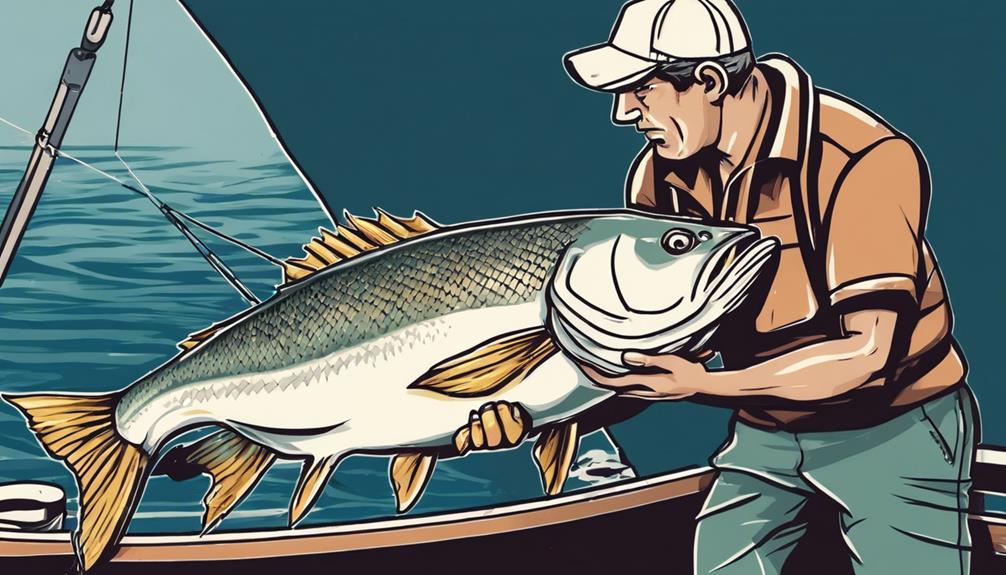
When handling fish on the boat, ensure you have the right tools and techniques to safely and effectively manage your catch. Proper fish handling not only ensures your safety but also contributes to the conservation of marine life. Here are some essential tips for handling fish on the boat:
- Use Proper Gripping Techniques: Avoid touching the fish with dry hands as it can damage their protective mucus layer. Use wet hands or gloves to handle the fish gently, supporting its body properly to avoid unnecessary stress.
- Practice Catch and Release: If you aren't planning to keep the fish, practice catch and release techniques. Use barbless hooks to minimize injury, handle the fish minimally, and release it back into the water as quickly as possible to ensure its survival.
- Promote Sustainability: Follow sustainable fishing practices by adhering to catch limits, respecting size regulations, and releasing endangered species. By practicing responsible fishing, you contribute to the preservation of fish populations and the marine ecosystem.
Implementing these fish handling and conservation techniques, including catch release and sustainability practices, ensures a more enjoyable and environmentally friendly deep-sea fishing experience. Remember, the well-being of the fish and the marine environment is in your hands.
Proper Etiquette for Deep Sea Fishing Charters
Proper etiquette for deep sea fishing charters ensures a harmonious and enjoyable experience for everyone on board. Fishing etiquette plays a crucial role in maintaining a positive atmosphere during the trip. Firstly, always follow the instructions provided by the captain and crew. They're experienced professionals who know the best practices for a successful fishing expedition. Respect their guidance and expertise to make the most out of your trip.
Charter behavior is another essential aspect of deep sea fishing etiquette. Be considerate of your fellow anglers by giving them ample space to fish comfortably. Avoid casting your line too close to someone else's spot to prevent tangles and conflicts. Additionally, keep the boat tidy by disposing of trash in the designated bins. A clean environment not only shows respect for the crew and the vessel but also contributes to a more pleasant experience for everyone.
Furthermore, patience and courtesy are key components of good charter behavior. Remember that deep sea fishing requires waiting for the right catch, so maintain a positive attitude even if the fish aren't biting. Encourage and support your fellow anglers, celebrating each catch regardless of size. By adhering to proper fishing etiquette and displaying respectful charter behavior, you contribute to a positive and enjoyable deep sea fishing experience for all.
Frequently Asked Questions
How Do I Prevent Seasickness While Deep Sea Fishing?
To prevent seasickness while deep sea fishing, you can try natural remedies like ginger and acupressure wristbands. Medication can also help alleviate symptoms.
Practice deep breathing techniques to stay calm and reduce nausea. Remember to stay hydrated and avoid heavy meals before your trip.
What Should I Do if I Hook a Fish That's Too Big for Me to Handle on My Own?
If you hook a fish that's too big for you to handle alone, remember to stay calm and focused. Utilize proper fishing techniques like using your body weight to control the fish. If you feel overwhelmed, seek assistance from fellow anglers or crew members.
Prioritize safety precautions by wearing gloves and using a gaff or net to manage the catch efficiently. Remember, it's okay to ask for help when needed to ensure a successful fishing experience.
Are There Any Regulations or Restrictions I Need to Be Aware of When Deep Sea Fishing?
When deep sea fishing, it's crucial to know about fishing regulations and catch limits. These rules vary by location, so always check beforehand. Regulations may include size restrictions, bag limits, and protected species.
Ignoring these rules can lead to fines or penalties. Stay informed and respect the regulations to ensure sustainable fishing practices and protect the marine environment for future generations.
How Can I Best Prepare for Unpredictable Weather Conditions While Out at Sea?
To prepare for unpredictable weather while out at sea, pack emergency supplies like first aid kits and extra clothing.
Implement safety measures by wearing life jackets and staying informed about weather forecasts.
Improve navigation skills and bring communication devices such as radios or satellite phones.
These tools can help you stay safe and connected in case of any unexpected weather changes while deep sea fishing.
What Should I Do if I Accidentally Hook a Marine Animal While Fishing?
If you accidentally hook a marine animal while fishing, it's essential to act swiftly.
First, reel in the line carefully to avoid causing further harm.
Next, assess the situation and determine if the animal can be safely released.
If the creature is injured, handle it gently and consider contacting local marine conservation authorities.
Practicing ethical fishing practices, such as using barbless hooks and proper handling techniques, can help prevent these situations and protect marine life.
Conclusion
Now that you have the essential gear, knowledge of terminology, and safety measures in mind, you're ready to tackle deep sea fishing like a pro.
Remember to bait your hooks strategically, reel in those big catches using proper techniques, and handle your fish with care once you've caught them.
With these beginner's tips, you'll be well on your way to a successful deep sea fishing adventure.
Enjoy the thrill of the open sea and the satisfaction of a great catch!
